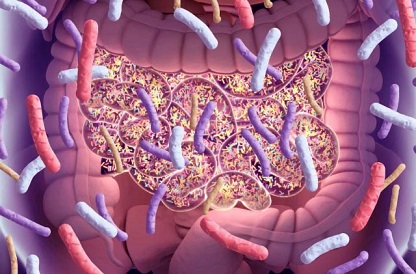Study explores the impact of spike proteins from COVID-19 mRNA vaccines on gut bacteria
Nikhil Prasad Fact checked by:Thailand Medical News Team Aug 26, 2024 1 year, 4 months, 4 days, 3 hours, 7 minutes ago
Medical News: Researchers from institutions around the globe, including the Autlan Regional Hospital in Mexico, the University Hospitals Sussex in the UK, and the University of South Florida in the USA, have conducted a study exploring the potential impact of spike proteins, derived from mRNA vaccines, on gut health. This
Medical News report delves into their findings, suggesting that the spike protein could negatively influence the delicate balance of beneficial bacteria in the gut.
 Study explores the impact of spike proteins from COVID-19 mRNA vaccines on gut bacteria
Study explores the impact of spike proteins from COVID-19 mRNA vaccines on gut bacteria
The study, led by a team of international scientists, raises questions about whether the spike protein, produced in response to mRNA vaccines for COVID-19, could enter the gut and disrupt the symbiotic relationship between gut bacteria and the human host. The study findings provide insights into the experimental protocols proposed by the researchers to test this hypothesis and highlights the potential implications of their findings.
The Gut Microbiota and Its Role in Health
The gut microbiota, a diverse collection of bacteria residing in the human digestive system, plays a crucial role in maintaining overall health. It aids in digestion, boosts immunity, and even influences brain-gut interactions. However, the emergence of COVID-19 and the subsequent development of mRNA vaccines have raised concerns about the unintended effects on gut health.
Previous studies have shown that SARS-CoV-2, the virus responsible for COVID-19, can infect and destroy specific bacterial strains in the gut. This led the researchers to hypothesize that the synthetic spike protein, produced in response to mRNA vaccines, could similarly impact the gut microbiota.
The Hypothesis: Synthetic Spike Protein and Gut Dysbiosis
The study suggests that the synthetic spike protein may enter intestinal cells after vaccination, triggering an inflammatory response that disrupts the balance of the gut microbiota. This disruption, known as gut dysbiosis, could lead to the dysfunction or even death of beneficial bacteria such as Bifidobacterium and Faecalibacterium prausnitzii.
To test this hypothesis, the researchers propose both in vitro (laboratory-based) and in vivo (animal-based) experiments. These experiments aim to assess whether the spike protein can directly interact with gut cells, trigger inflammation, and ultimately alter the composition of the gut microbiota.
Experimental Approach: In Vitro and In Vivo Studies
In vitro experiments involve growing human intestinal cells in a laboratory setting and exposing them to varying concentrations of the synthetic spike protein. The researchers plan to monitor the cells for signs of inflammation, changes in tight junction proteins (which maintain gut barrier integrity), and overall cell viability.
The in vivo studies, on the other hand, involve administering synthetic spike protein to mice and observing its effects on their gut health. By analyzing blood samples, intestinal tis
sues, and fecal samples, the researchers hope to gain a comprehensive understanding of how the spike protein might influence gut microbiota composition and function.
Potential Implications: Understanding Long-Term Effects
One of the study's key findings is the potential for the spike protein to interact with the ACE2 receptor, which is expressed on the surface of intestinal cells. This interaction could disrupt the gut epithelial barrier, leading to increased intestinal permeability, also known as "leaky gut." This condition has been linked to various inflammatory diseases and could provide a pathway for harmful bacteria to enter the bloodstream, further exacerbating inflammation.
The researchers also highlight the importance of tryptophan, an essential amino acid, in maintaining gut health. They propose that the binding of the spike protein to the ACE2 receptor could lead to tryptophan depletion, thereby increasing susceptibility to intestinal inflammation.
Expanding the Study: The Need for Further Research
While the study provides valuable insights, it also underscores the need for further research to confirm these findings and explore the long-term effects of mRNA vaccines on gut health. The researchers suggest that future studies should focus on a broader range of gut bacteria and consider factors such as age, diet, and pre-existing health conditions.
Interestingly, some studies have claimed beneficial effects of certain COVID-19 vaccines on gut health. For instance, the BBIBP-CorV vaccine has been shown to increase the abundance of beneficial bacteria like Faecalibacterium prausnitzii in the gut. This highlights the complex relationship between vaccines and the gut microbiota, suggesting that not all vaccines have the same impact.
Conclusion: Balancing Vaccine Benefits and Gut Health
While mRNA vaccines have played a crucial role in controlling the COVID-19 pandemic, this study raises important questions about their potential impact on gut health. The researchers emphasize that more studies are needed to fully understand the long-term implications of mRNA vaccines on the gut microbiota and overall health.
For individuals who have received multiple mRNA vaccines or suffered severe COVID-19, the researchers suggest considering prebiotic and probiotic supplements to help restore gut health. This could potentially mitigate any adverse effects on the gut microbiota and support overall immune function.
The study findings were published in the peer-reviewed journal: COVID.
https://www.mdpi.com/2673-8112/4/9/97
For the COVID-19 News, keep on logging to Thailand
Medical News.
Read Also:
https://www.thailandmedical.news/news/long-term-dysregulation-of-the-gut-in-response-to-sars-cov-2-viral-persistence-contributes-to-long-covid
https://www.thailandmedical.news/news/compared-to-earlier-sars-cov-2-variants,-omicron-causes-a-greater-degree-of-dysbiosis-of-the-intestinal-microbiota
